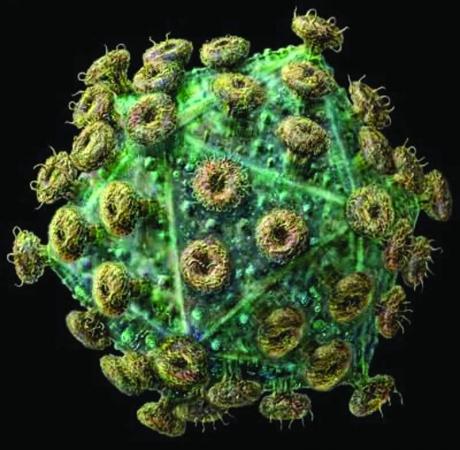据新加坡《联合早报》报道,澳大利亚研究人员在一些艾滋病病毒携带者身上,识别出一种艾滋病病毒抗体。科研人员希望在此基础上研发出预防艾滋病的疫苗。

艾滋病病毒
墨尔本大学研究人员在分析100名艾滋病病毒携带者血液样本时发现,这些人感染艾滋病病毒后,体内能够产生一种称为ADCC的抗体,这种抗体可促使人体免疫系统找到并攻击艾滋病病毒,从而不会发病。
领导这项研究的墨尔本大学教授肯特说,对血液样本进行分析后发现,这种抗体也能使艾滋病病毒的攻击力减弱。他说,这种抗体不能起到治愈艾滋病的效果,但如果人们在感染艾滋病病毒前获得这种抗体,则可能起到预防效果。
英文报道:
Latest insights into immunity to HIV could help to develop a vaccine to build antibodies' defences against the disease, a University of Melbourne, Australia study has found. By investigating the action of thehuman antibodies called ADCC, in people with HIV, researchers were ableto identify that the virus evolves to evade or 'escape' the antibodies.
Professor Stephen Kent of the University of Melbourne and one of the senior authors on the paper said ADCC antibodies have been strongly implicated in protection from HIV in several vaccine trials but their action was poorly understood.
"These results show what a slippery customer the HIV virus is, but also shows that these ADCC antibodies are really forcing the virus into changing, in ways that cause it to be weaker," he said.
"It also implies that if good ADCC antibodies were available prior toinfection, via a vaccine, we might be able to stop the virus taking hold. This is the holy grail."
The group at the University of Melbourne's Department of Microbiologyand Immunology analysed blood samples of people with HIV and found their virus had evolved to evade or 'escape' the ADCC antibodies againstHIV they are making to try to control their virus.
The team led by Dr Ivan Stratov and Professor Kent employed a novel technology developed in their laboratory to find where ADCC antibodies were attacking the virus. They then looked at how the sequence of the virus had mutated over time to avoid the immune response.
"There is an urgent need to identify effective immunity to HIV and our studies suggest ADCC responses supply significant immune pressure onthe virus," Dr Ivan Stratov, a clinician and researcher said.
The group is now working on designing HIV vaccines to induce ADCC antibodies that make it more difficult for the virus to escape.
The work was published in the prestigious international journal PNAS.







